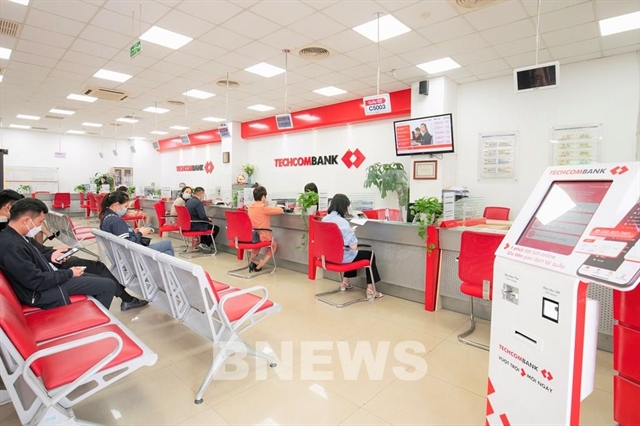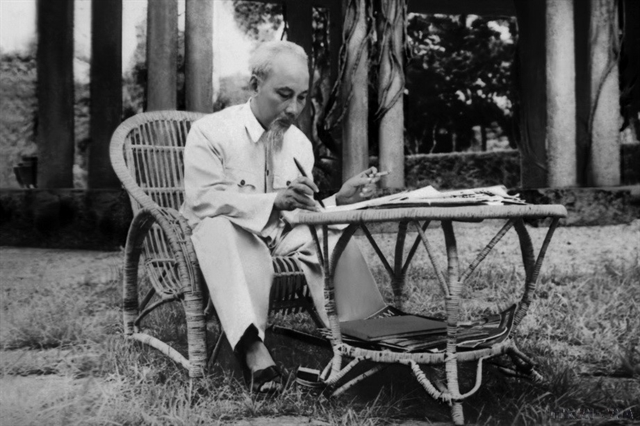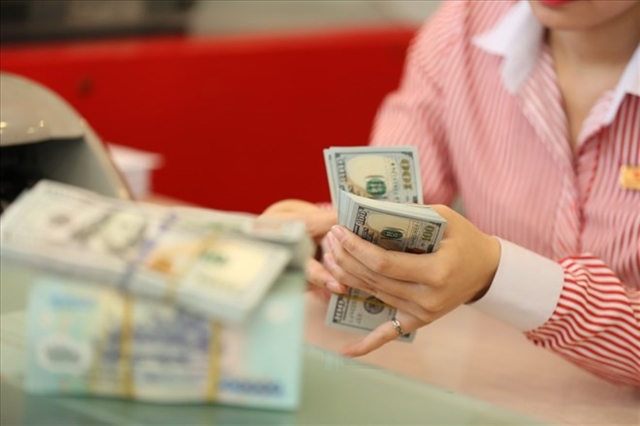 Economy
Economy

 |
| A bank teller counts the dollar at a transaction office in Hà Nội. The interbank exchange rate has decreased by more than 1.3 per cent since the beginning of August. — Photo laodong.vn |
HÀ NỘI — The foreign exchange rate in the domestic market has cooled rapidly since early this month, which could help the State Bank of Vietnam (SBV) implement a looser monetary policy, in order to support liquidity for the banking system and the economy.
The USD/VNĐ exchange rate has continuously decreased sharply in recent days. On the interbank market, the rate closed at VNĐ24,974 per dollar on Monday, down VNĐ87 compared to the end of last week. This is the first time since April 2024 that the exchange rate on the interbank market has been trading below VNĐ25,000.
The interbank exchange rate has decreased by more than 1.3 per cent since the beginning of August.
On Wednesday, the central exchange rate of the Vietnamese đồng against the US dollar was listed by the SBV at VNĐ24,246 per dollar, down VNĐ5 compared to the previous day.
At commercial banks, the exchange rate has not also stopped falling this week.
Vietcombank on Wednesday traded the dollar at VNĐ24,740 for buying and VNĐ25,080 for selling, down VNĐ120 compared to the previous day.
The rate at Eximbank was VNĐ24,760 per dollar for buying and VNĐ25,090 for selling.
Sacombank also listed the dollar down to VNĐ24,740 per dollar for buying and VNĐ25,080 for selling.
The exchange rate on the unofficial market has also continuously decreased and is currently trading at VNĐ25,350-VNĐ25,430 per dollar. This is the lowest price since March 2024. The rate started to fall sharply in the past month, especially in the first half of August. Compared to the peak of nearly VNĐ26,000 set at the end of June, the dollar price on the unofficial market currently decreases by about 2.3 per cent.
The dollar price in the domestic market has fallen in the context that the greenback has shown signs of weakening in the international market.
In addition, the dollar supply source in the domestic market is also being supported, as FDI registered and disbursement capital has increased compared to last year.
The dollar demand in the domestic market is not large, as businesses imported materials to serve production and business activities in the first months of this year, while import-export turnover has also recorded a positive surplus.
According to ACB's Market Research Department, as the exchange rate in the domestic unofficial market cooled down rapidly, the dollar has also weakened in the international market and the downward trend of the exchange rate may not stop this week.
According to experts, the rapid cooling of the exchange rate will create conditions for the SBV to implement a looser monetary policy, in order to support liquidity for the banking system and the economy.
Previously, in the second quarter and the first half of the third quarter this year, the SBV had to continuously impose tightening measures in the market, such as increasing open market operation (OMO) and bill interest rates and selling the dollar, to curb the increase in the exchange rate, which created pressure on the liquidity and interest rate of the banking system.
In the context of cooling exchange rate pressure, on August 5, the SBV simultaneously reduced the OMO and bill interest rate by 0.25 percentage points. Analysts expect this move will help support the liquidity of the banking system, contributing to cooling interest rates in the interbank market.
This shows that the SBV is confident in controlling the exchange rate and is ready to implement monetary policies to support the economy when the opportunity arises, analysts of the Phú Hưng Securities Company commented in a recent report.
Vietcombank Securities Company (VCBS) also believes in the context of positive macro-economic signs, along with the SBV's management orientation, liquidity of the banking system is expected to be more stable and abundant, and interbank interest rates may decrease again. — VNS




